
- Index
- Author
- Benson J Lossing (5)
- Benson J. Lossing (3)
- Bruce Catton (4)
- J. T. Trowbridge (5)
- Julia S. Wheelock (4)
- Kurz & Allison (5)
- Louisa May Alcott (9)
- Margaret Mitchell (5)
- Mixed Authors (32)
- Prof Allen E. Fowler (6)
- Robert Krick (4)
- Rossiter Johnson (5)
- Shelby Foote (29)
- Stephen Crane (4)
- Time Life (8)
- Ulysses S Grant (4)
- Ulysses S. Grant (6)
- Unknown (15)
- Various (21)
- Various Authors (8)
- Other (1075)
- Binding
- Format
- Publisher
- Charles L. Webster (8)
- Easton Press (55)
- H E Howard Inc (5)
- J H Moore & Company (6)
- John Trow (3)
- Kunz (5)
- L. Stebbins (8)
- Lange & Hillman (4)
- Lee And Shepard (5)
- Macmillan (3)
- Marvel Comics (4)
- Morningside (7)
- Mrs Frank Leslie (4)
- Random House (6)
- S. R. Gray (4)
- Sherman Publishing (4)
- Time Life Books (37)
- Time-life (4)
- Time-life Books (6)
- Unknown (8)
- Other (1071)
- Subject
- Topic
- Agriculture (8)
- American (us) (12)
- American Civil War (3)
- Bible (7)
- Books (3)
- Books, Civil War (23)
- Christianity, Bibles (30)
- Civil War (120)
- Civil War (1861-65) (524)
- Classics (14)
- European (4)
- Historical (28)
- History (6)
- Literature (5)
- Military (14)
- Poetry (4)
- Religion (4)
- The Civil War (5)
- The Sixth Corps (3)
- United States (10)
- Other (430)
James Moore Wayne Supreme Court Civil War 1st Ed. Signed 1943 Gov. Ellis Arnall
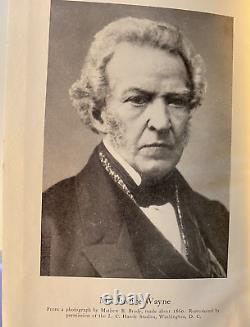
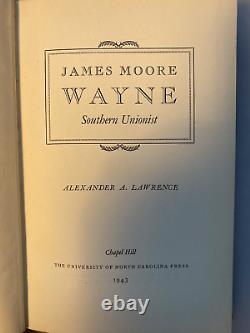
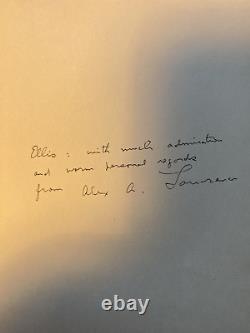

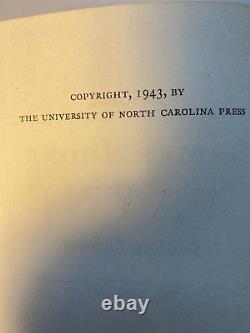
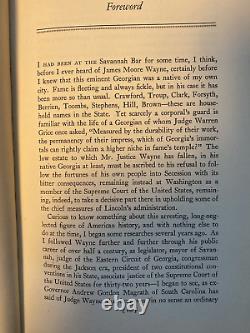
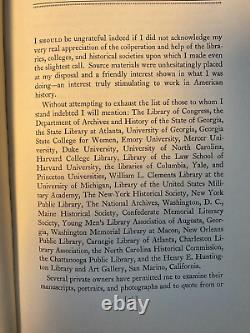
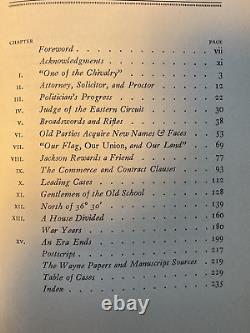
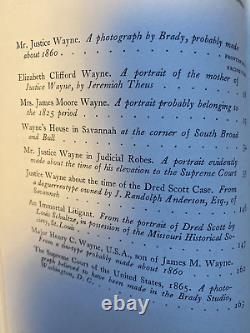


Offered: A book from the library of Governor Ellis Arnall 69th Governor of Georgia Signed by the author Judge Alexander A. Lawrence and presented to Governor Arnall James Moore Wayne Southern Unionist. Blue cloth xiv, 250 pp. Age toned tight binding first edition. Supreme Court Justice James Moore Wayne. A proud southern federalist who advocated for the very region of the country that stigmatized him as an enemy, James Moore Wayne served on the Court from 1835 to 1867. Born in 1790 to aristocratic parents in Savannah, Wayne's father owned plantations and rice fields, which included nearly 100 slaves. Wayne studied with an Irish tutor and qualified for enrollment in the College of New Jersey at the age of 13; however, because of his age, his tutors held him back a year and he matriculated in 1804.
As a student, Wayne tended to favor outside reading in lieu of his assignments, and he was temporarily expelled for participating in a school rebellion. Despite these troubles, he graduated in 1808. After graduation, Wayne studied with Judge Charles Chauncy of New Haven.
Wayne had to return to Savannah in 1810, though, after his father's death to settle the estate. He continued his legal studies under his brother-in-law, and was admitted to the bar in January 1811. He practiced law until the War of 1812, where he enlisted in the Chatham Light Dragoons, a volunteer Calvary unit. After the war, Wayne began his political career.
In 1815 and 1816, Wayne was elected to represent Chatham County in the Georgia legislature by an exceedingly large margin. A year later, he became the alderman of the city of Savannah, and at the age of 27, he was elected mayor. After only two years, Wayne resigned to continue his law practice. While still working at his practice, he was elected as a judge for the newly created court of common pleas for Savannah.Eventually, he was elected superior court judge for Georgia's eastern circuit. A strong supporter of Andrew Jackson, Wayne left the bench to run for Congress in 1828 as a Democrat and was reelected in 1830, 1832, and 1834.
In Congress, he served as chairman to the Committee on Foreign Affairs. Needing a southern voice on the bench, Jackson nominated Wayne to the Supreme Court on January 6, 1835 to fill Associate Justice William Johnson's vacancy.The first Georgian to serve on the Court, Wayne was just short of 45 when he became a justice. He was a strong nationalist, which was unusual for a southerner at the time. In the Passenger Cases, he opposed the exercise of state power, and in Cooley v. Board of Wardens of the Port of Philadelphia he wrote a nationalist dissent dealing with sovereignty and commerce. Surprisingly, Wayne, a slave owner, was rather unsupportive of slavery.
In his first assigned case, he ruled that if a slave owner gave a slave freedom in his will, that right to freedom was superior to a claim of a creditor if there were other property assets to meet the owner's debts. Despite this decision, he did support the opinion in Dred Scott v. Wayne played an influential role in this decision by refusing to let the Court issue a narrow holding.
He advocated a broader approach, hoping to resolve the slavery question. The Civil War began a few years after this controversial decision.During the war, Wayne refused to resign and remained an avid supporter of the Union. He believed that the Court needed a judicial voice on behalf of the south. In 1862, a Georgia court repealed his citizenship, branded him an enemy alien, and seized his property. After the war, he obtained a pardon for the judge who issued this ruling, and he became a voice for the south and opposed any measures that he thought sought to punish it.
In 1867, Wayne contracted typhoid fever, and he died on July 5th at the age of 77. His southern support of nationalism during the Civil War make him an important justice in American history. He was the son of Alexander Atkinson Lawrence and Isabel Ashby Paine. He attended Massie School Savannah, Ga. And Woodberry Forest Preparatory (Orange, Virginia).
He received his bachelor's degree from the University of Georgia in 1929 and read law in his father's Savannah law office, Lawrence and Abrahams. He married Margaret Adams on April 18, 1933, and they had two children. In 1968, he was nominated to the bench of the Federal District Court of South Georgia. As judge he faced the issue of the desegregation of the Savannah-Chatham County public school system.
One of his highest profile civil-damages case grew out of the February 1971 explosion at the Thiokol Chemical Corporation in Woodbine, Georgia. Lawrence served as president of the Georgia and Savannah bar associations. He was a member of the Georgia Bar Examiners' Board, the American College of Trial lawyers, Georgia Historical Commission, Society of Colonial Wars, Society of the Cincinnati, and he served as president of the Georgia Historical Society from 1945 until 1952.
He was an active participant in the historic preservation movement in Savannah. Lawrence possessed a great interest in history and wrote several works. His first, James Moore Wayne, Southern Unionist (1943), was a biography of a Savannahian who served on the U. His most popular work, Storm Over Savannah 1951; rev. 1979, recounted the siege of the city in 1779.Lawrence's Present for Mr. Lincoln (1961) received an award from the American Association of State and Local History. Other works include: James Johnston, Georgia's First Printer (1956), and A History of the Georgia Supreme Court (1948). Alexander Atkinson Lawrence died on August 20, 1979.
This item is in the category "Books & Magazines\Antiquarian & Collectible". The seller is "pristinus" and is located in this country: US. This item can be shipped to United States, Fiji, Papua New Guinea, Wallis and Futuna, Gambia, Malaysia, Taiwan, Poland, Oman, Suriname, United Arab Emirates, Kenya, Argentina, Guinea-Bissau, Armenia, Uzbekistan, Bhutan, Senegal, Togo, Ireland, Qatar, Burundi, Netherlands, Iraq, Slovakia, Slovenia, Equatorial Guinea, Thailand, Aruba, Sweden, Iceland, Macedonia, Belgium, Israel, Kuwait, Liechtenstein, Benin, Algeria, Antigua and Barbuda, Italy, Swaziland, Tanzania, Pakistan, Burkina Faso, Panama, Singapore, Kyrgyzstan, Switzerland, Djibouti, Chile, China, Mali, Botswana, Republic of Croatia, Cambodia, Indonesia, Portugal, Malta, Tajikistan, Vietnam, Cayman Islands, Paraguay, Saint Helena, Cyprus, Seychelles, Rwanda, Bangladesh, Australia, Austria, Sri Lanka, Gabon Republic, Zimbabwe, Bulgaria, Czech Republic, Norway, Côte d'Ivoire (Ivory Coast), Kiribati, Turkmenistan, Grenada, Greece, Haiti, Greenland, Yemen, Afghanistan, Montenegro, Mongolia, Nepal, Bahamas, Bahrain, United Kingdom, Bosnia and Herzegovina, Hungary, Angola, Western Samoa, France, Mozambique, Namibia, Peru, Denmark, Guatemala, Solomon Islands, Vatican City State, Sierra Leone, Nauru, Anguilla, El Salvador, Dominican Republic, Cameroon, Guyana, Azerbaijan Republic, Macau, Georgia, Tonga, San Marino, Eritrea, Saint Kitts-Nevis, Morocco, Saint Vincent and the Grenadines, Mauritania, Belize, Philippines, Democratic Republic of the Congo, Republic of the Congo, Colombia, Spain, Estonia, Bermuda, Montserrat, Zambia, South Korea, Vanuatu, Ecuador, Albania, Ethiopia, Monaco, Niger, Laos, Ghana, Cape Verde Islands, Moldova, Madagascar, Saint Pierre and Miquelon, Lebanon, Liberia, Bolivia, Maldives, Gibraltar, Hong Kong, Central African Republic, Lesotho, Nigeria, Mauritius, Saint Lucia, Jordan, Guinea, Canada, Turks and Caicos Islands, Chad, Andorra, Romania, Costa Rica, India, Mexico, Serbia, Kazakhstan, Saudi Arabia, Japan, Lithuania, Trinidad and Tobago, Malawi, Nicaragua, Finland, Tunisia, Luxembourg, Uganda, Brazil, Turkey, Germany, Egypt, Latvia, Jamaica, South Africa, Brunei Darussalam, Honduras.
- Binding: Hardcover
- Language: English
- Special Attributes: 1st Edition
- Author: Alexander A. Lawrence
- Publisher: Chapel Hill
- Topic: Civil War (1861-65)
- Subject: Military & War
- Original/Facsimile: Original

